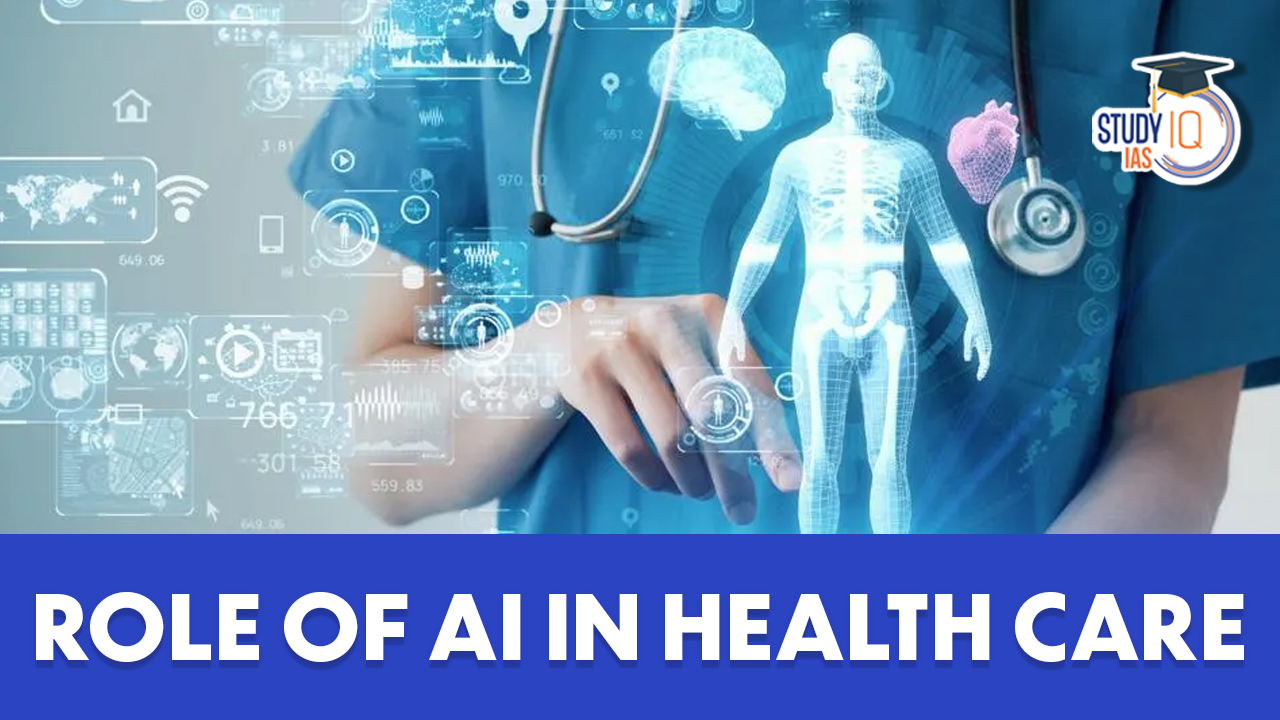Table of Contents
Context: Artificial Intelligence (AI) has emerged as a groundbreaking technology transforming numerous industries, and healthcare is no exception.
About the Artificial Intelligence (AI)
- Artificial Intelligence (AI) is a simulation of human intelligence into a computer machine so that it can think and act like a human.
- AI systems are designed to simulate or replicate human cognitive abilities, such as perception, reasoning, learning, and problem-solving.
- AI rely on algorithms and computational models to process and analyze large amounts of data, extracting patterns and making predictions or decisions based on that information.
- AI can be classified into two main categories:
- Narrow AI or Weak AI: This type of AI is designed to perform specific tasks and is limited to a narrow domain. Examples include voice assistants like Siri and Alexa.
- General AI or Strong AI: It refers to a system that possesses the ability to understand, learn, and apply its intelligence across a wide range of tasks and domains, similar to human intelligence.

Various Applications of AI in Healthcare
- Disease Diagnosis: Machine learning algorithms can analyze patient data, including symptoms, medical records, and genetic information, to identify patterns and predict diseases.
- Medical Imaging: AI can assist in the interpretation of medical images such as X-rays, CT scans, MRIs, and mammograms to detect abnormalities, tumors, or other signs of diseases with high accuracy.
- Personalized Treatment Plans: By considering a patient’s medical history, genetic information, and current condition, AI systems can recommend the most effective treatment options and dosages.
- AI Powered Virtual Assistants and Chatbots: They can provide patients with 24/7 access to medical information, answer questions about symptoms, medications, and provide healthcare guidance.
- Drug Discovery and Development: AI can accelerate the process of drug discovery by analyzing vast amounts of biological and chemical data.
- Remote Patient Monitoring: AI-enabled devices can collect and analyze real-time patient data, such as vital signs, activity levels, and sleep patterns, allowing healthcare providers to remotely monitor patients.
- Robotics and Surgery: AI-powered robots can assist surgeons during complex procedures by providing real-time feedback, precision, and enhanced visualization.
Risks and Challenges with AI in Healthcare
- Data Privacy and Security: The use of AI in healthcare involves the collection, storage, and analysis of sensitive patient data. Protecting this data from unauthorized access, breaches, and misuse is crucial.
- Bias and Discrimination: AI systems learn from data, and if the data used to train these systems is biased or unrepresentative, it can lead to biased outcomes and unequal treatment.
- Lack of Transparency: Many AI algorithms, such as deep learning models, operate as “black boxes” where it is challenging to understand how they arrive at specific conclusions, which can make it difficult to trust and validate AI systems in critical healthcare decisions.
- Limited Regulation and Standards: Clear guidelines and regulations are needed to address issues related to data usage, algorithmic accountability, validation, and safety.
- Integration with Existing Healthcare Systems: Integrating AI technologies into existing healthcare systems can be complex and challenging.
- Liability and Accountability: Determining liability and accountability in cases where AI systems are involved in medical decisions or errors can be complicated.
- Overreliance on AI: While AI can augment healthcare practices, it should not replace human expertise and judgment entirely. There is a risk of overreliance on AI systems, which could lead to medical errors or missed diagnoses if human oversight and critical thinking are neglected.
Current State of AI healthcare in India
- India is one of the few developing countries leading the way on AI in health.
- Data and AI in healthcare have the potential to add $25-$35 billion to India’s GDP by 2025.
- As per the Indian AI Healthcare Market 2019-2025 report, AI in the Indian healthcare industry is estimated to grow at a CAGR of 50.9% during the forecast period.
- Current scenario: Indian start-ups are continuing to refine and prioritise increased personalised medical care by using AI tools.
- Some of the AI healthcare start-ups in India that are reshaping the industry are:
- HealthifyMe: Harnesses AI to provide personalised diet and fitness information and coaching.
- Dozee: Contactless health monitors that enable early detection of any health deterioration.
- Niramai: Early-stage detection of breast cancer.
- Tricog: Offer virtual cardiology services to distant clinics.
ICMR Guidelines for AI Use in the Health Sector
Indian Council of Medical Research (ICMR) issued a guiding document- “The Ethical Guidelines for Application of AI in Biomedical Research and Health care”, which outlines 10 key patient-centric ethical principles for Artificial Intelligence (AI) application in the health sector.
- Accountability and Liability Principle: It underlines the importance of regular internal and external audits to ensure optimum functioning of AI systems which must be made available to the public.
- Autonomy Principle: It ensures human oversight of the functioning and performance of the AI system. Before initiating any process, it is also critical to attain consent of the patient who must also be informed of the physical, psychological and social risks involved.
- Data Privacy Principle: It mandates AI-based technology should ensure privacy and personal data protection at all stages of development and deployment.
- Collaboration Principle: This principle encourages interdisciplinary, international collaboration and assistance involving different stakeholders.
- Safety and Risk Minimization Principle: This principle aimed at preventing “unintended or deliberate misuse”, anonymized data delinked from global technology to avoid cyber-attacks, and a favorable benefit-risk assessment by an ethical committee among a host of other areas.
- Accessibility, Equity and Inclusiveness Principle: This acknowledge that the deployment of AI technology assumes widespread availability of appropriate infrastructure and thus aims to bridge the digital divide.
- Data Optimization: Poor data quality, inappropriate and inadequate data representations may lead to biases, discrimination, errors and suboptimal functioning of the AI technology.
- Non-Discrimination and Fairness Principles: In order to refrain from biases and inaccuracies in the algorithms and ensure quality AI technologies should be designed for universal usage.
- Trustworthiness: In order to effectively use AI, clinicians and healthcare providers need to have a simple, systematic and trustworthy way to test the validity and reliability of AI technologies. In addition to providing accurate analysis of health data, a trustworthy AI-based solution should also be lawful, ethical, Reliable and valid.
Relevance of Artificial Intelligence topic in UPSC 2023
Artificial Intelligence plays a significant role in the UPSC exam as it is a rapidly evolving field with wide-ranging implications for governance, policymaking, and society at large. This year also UPSC in some of its question in Prelims and Mains Exam where focused on UPSC. Artificial Intelligence comes under Science and Technology part of UPSC comes under GS Paper 3 of UPSC Syllabus.
The UPSC Exam covers the topic of AI at all levels, and students can thoroughly cover it by studying current affairs. A candidate’s knowledge and analytical skills may be improved by having an understanding of the principles, applications, and ethical challenges surrounding artificial intelligence (AI). This will allow them to analyse problems in technology, government, and society critically.
Relevance of StudyIQ Blog in UPSC
One of the most relevant topics for the UPSC Exam is artificial intelligence. To properly prepare for the topic, candidates can use the Science and Technology Blogs available for free on StudyIQ Website. The GS Paper 3 Syllabus of the UPSC Mains covers AI and related concepts. StuddyIQ Blogs covers all the topics related to Science and Technology that are important for UPSC Syllabus or frequently asked in UPSC Exams. All the concepts and current data or information’s related to the topic and available in the blogs.
Candidates who are preparing for UPSC can find all the topic and holistically covered in the blogs of UPSC that has been very helpful for the candidates who have followed our blogs and get good rank in UPSC. Candidates who are looking forward for the preparations of UPSC can go through blogs and get most appropriate content for successful result.


 Gutti Koya Tribals in Post-Conflict Indi...
Gutti Koya Tribals in Post-Conflict Indi...
 Civil Services Day 2025, Date, History, ...
Civil Services Day 2025, Date, History, ...
 GPSC Syllabus, Download Prelims and Main...
GPSC Syllabus, Download Prelims and Main...





















